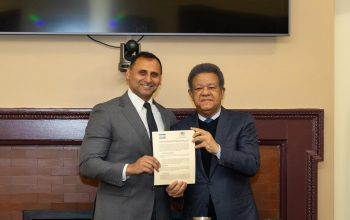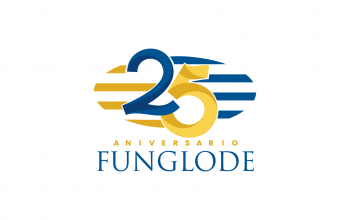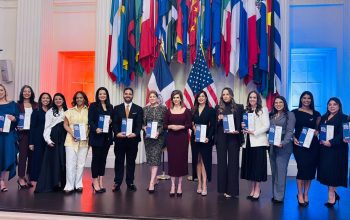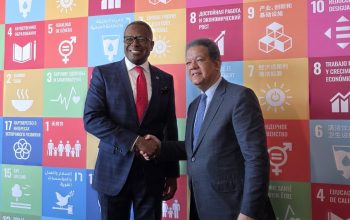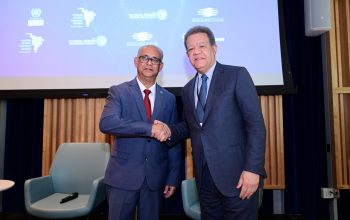news
Ambassador of Peru Stresses the Need to Ensure All Members of Society Have Access to Financial Services at Commission on the Status of Women
March 17, 2017
The NGO Committee for Social Development and the NGO Committee on Financing for Development, with the support of Virginia Gildersleeve International, the Global Foundation for Democracy and Development, and several other NGO committee members, hosted an interactive debate at the UN Church Center in Manhattan on Monday March 13. The event which took place as part of the 61st session of the Commission on the Status of Women brought together a variety of expert speakers for a
substantive discussion around the topic of financial inclusion as a tool for poverty eradication and women’s empowerment.
The event, which was registered by Virginia Gildersleeve International Fund, was moderated by Anita Thomas, the organization’s Representative to the UN and Executive Committee Member of the NGO Committee on Financing for Development. Following some brief welcome remarks and introduction of the speakers, Anita Thomas gave the floor
to Ambassador Meza-Cuadra of Peru who gave the opening remarks.
The ambassador highlighted the efforts made within his country to promote financial inclusion, by empowering women and improving their lives all over the world. Underscoring the country’s long term objectives for women’s empowerment he stated that they were “planning in 5 years’ time to provide 75% of people in Peru with an account in a financial institution and have 5
times more people using electronic means for financial transactions, up from 1 million people today”. Supporting the setup of an agreement between 34 key parties in the private sectors, including banking services providers and regulators, Ambassador Meza-Cuadra explained that the Modelo Peru agreement would enable the creation of a system whereby even people in the most remote parts of the country would be able to receive monetary payments through their cell phones. The ambassador
stressed that the next phase for the global application of this scheme would be the sharing of best practices with developing countries looking to implement this framework in their own region.
The Ambassador’s opening remarks were followed by interventions by three more speakers after which the audience were given the opportunity to ask questions and make comments, these speakers included Jeri Rhodes, President of the Virginia Gildersleeve International Fund,
Daniel Platz, Economic Affairs Officer, Financing for Development Office of the United Nations, and Yrenilsa Lopez, Investment Officer at Women’s World Banking Asset Management.
Jeri Rhodes gave the audience an overview of her organization’s projects explaining that 54% of them were focused on helping women and girls to create income. She stressed that “training in basic financial skills such as marketing, bookkeeping and financial planning,
improves business practices, which in turn increases chances for business survival”. She concluded her intervention by reminding participants that, as VGIF’s grantees’ projects demonstrate, “business survival changes lives. Financial inclusion increases a women’s influence both inside her home and outside in her community”.
Daniel Platz informed the audience of the progress achieved since the adoption of
the Addis Ababa Action Agenda and the associated benefits of financial inclusion. He noted that the commitments of the AAAA “promote financial literacy, expand peer learning and experience-sharing among countries and regions and commit to strengthening capacity development including through the UN development systems”.
During the Q&A session, the speakers fielded some very engaging questions from the audience on topics ranging from the
difficulty of financial literacy training for the public to the role of NGOs in providing financial services.
Background
The latest numbers from Global Findex, a comprehensive database on financial inclusion from the World Bank Group, reveal that while more than 700 million people gained access to formal financial services between 2011 and 2014, the gender gap in financial inclusion remains a stark reality with women in emerging economies
having a 20% less likely of having a bank account than men and 17% less likely to have borrowed formally.
Studies also show that women in rural areas tend to be less educated and less likely to be formally employed. The lack of financial inclusion makes it harder for women, especially in rural areas, where in many households she is the sole income earner or the main income earner, to save for the future and borrow the necessary funds to grow her business, send her
children to school and own assets.
About CSW61
The sixty-first session of the Commission on the Status of Women will take place at the United Nations Headquarters in New York from 13 to 24 March 2017. The Priority theme is Women’s economic empowerment in the changing world of work and the Review theme is Challenges and achievements in the implementation of the Millennium Development Goals for women and girls.
About the NGO Committee on Financing for Development
The NGO Committee on Financing for Development at the United Nations advocates for a worldwide economy that is environmentally and socially sustainable, ethical, and people-centered. Guided by the 2002 Monterrey Consensus, we urge policymakers to support development strategies that end global poverty and advance human rights.
About the NGO Committee on Social
Development
The NGO Committee on Social Development is dedicated to raising awareness of and contributing to discussions on social development issues taken up by the United Nations (UN) System and in particular by the UN Commission for Social Development. The Committee also advocates on social development issues in other forums such as the High Level Political Forum on Sustainable Development, the Commission on the Status of Women, the Economic and Social Council
(ECOSOC), and at the General Assembly. Committee members keep one another informed and deliver group statements to the UN voicing ideas and positions on key social development issues. In addition, the Committee is focused contributing to the implementation of the outcome of the World Summit on Social Development.
Related Links:
61st Session of the Commission on the
Status of Women
http://www.ngosonffd.org/
https://ngosocdev.org/

